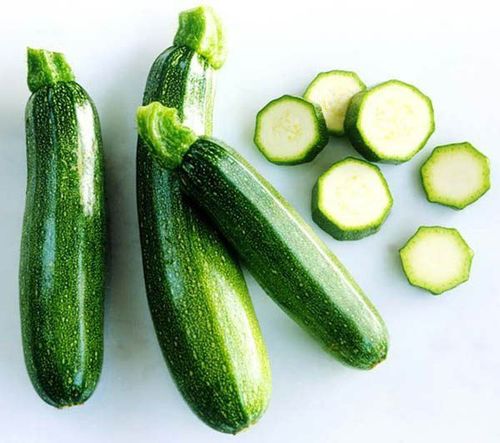This is an automatically translated article.
If you're looking for a healthy way to lose weight, it's time to learn about the health benefits of zucchini. So is eating zucchini good? Zucchini plays a big role in weight loss while enhancing the nutrient content of your diet. Moreover, it can help to enhance eyesight and prevent all diseases that occur due to vitamin C deficiency such as scurvy, sclerosis and easy bruising. The following article will detail 12 health and nutritional benefits of zucchini.1. What is a zucchini?
Zucchini, also known as Courgette, is a summer squash in the plant family Cucurbitaceae, along with melons, spaghetti squash, and cucumbers. It can grow to more than 3.2 feet (1 meter) in length but is usually harvested when it is immature - when it is less than 8 inches (20 cm) in size.Although zucchini is often considered a vegetable, botanically it is classified as a fruit. Zucchini also has many varieties identified by color, ranging from dark yellow to dark green.
While squash is native to the Americas, zucchini was first grown in the early 1800s in Italy. Zucchini was then used in folk medicine to treat colds, aches, and various health conditions. However, not all of its uses are scientifically proven. So what is the effect of zucchini? And is it good to eat zucchini? Come to the following 12 health benefits of zucchini to find the answer.
2. 12 health benefits of zucchini
2.1. Zucchini is rich in nutrientsZucchini is rich in vitamins, minerals and other beneficial plant compounds. One serving (about 223 grams) of cooked zucchini can provide:
Calories: 17 Protein: 1 gram Fat: less than 1 gram Carb: 3 grams Sugar: 1 gram Fiber: 1 gram Vitamin A: 40 % of DV Manganese: 16% of DV Vitamin C : 14% of DV Potassium : 13% of DV Magnesium: 10% of DV Vitamin K : 9% DV Folate : 8% DV Copper : 8% DV Phosphorus: 7% DV Vitamin B6 : 7% DV Thiamine day: 5% of the recommended daily requirement It also contains small amounts of iron, calcium, zinc and several other B vitamins. In particular, abundant vitamin A content can help support eyesight and the body's immune system. Raw zucchini offers a similar nutritional profile to cooked zucchini, but with less vitamin A and more vitamin C, a nutrient that tends to be reduced when cooked.

Bí ngòi có tác dụng gì là thắc mắc của nhiều người
Carotenoids - such as lutein, zeaxanthin and beta-carotene - are especially abundant in zucchini. They may benefit our eyes, skin, and heart, as well as provide some protection against certain types of cancer such as prostate cancer.
Research has shown that the bark of the tree contains the highest levels of antioxidants. Yellow zucchini may contain slightly higher concentrations than light zucchini.
2.3. Contributing to digestive health Zucchini may contribute to digestive health in a number of ways.
For normal people, zucchini contains a lot of water, which can soften stools. This makes them easier to pass through the digestive system and reduces the risk of constipation.
Zucchini also contains both soluble and insoluble fiber. Insoluble fiber adds bulk to stool and helps food move through your intestines more easily, reducing the risk of constipation further. This benefit is doubled if you get enough fluids in your diet. Meanwhile, soluble fiber creates a favorable environment for beneficial bacteria to grow in the intestinal tract. In turn, these friendly bacteria produce short-chain fatty acids (SCFAs) that nourish your gut cells. Furthermore, SCFAs may help reduce inflammation and symptoms of certain intestinal disorders such as irritable bowel syndrome (IBS), Crohn's disease, and ulcerative colitis.
2.4. May Lower Blood Sugar Zucchini may help lower blood sugar in people with type 2 diabetes. With 3 grams of carbs per cooked serving (232 grams), zucchini provides a healthy dose of zucchini. A great low-carb alternative to pasta for those looking to reduce their carb intake. It can also be shredded or sliced to replace spaghetti, linguini or lasagna in dishes.
Low-carb diets can lower blood sugar and insulin levels, both of which can keep blood sugar stable and reduce the need for medication in people with type 2 diabetes.
Moreover, the fiber of zucchini helps stabilize blood sugar levels, preventing spikes after meals. Diets high in fiber from fruits and vegetables - including zucchini - have consistently been linked to a reduced risk of type 2 diabetes.
The fiber found in zucchini can also help increase insulin sensitivity, which can also help stabilize blood sugar. Additionally, animal studies note that zucchini peel extract may help lower blood sugar and insulin levels. This may be due to the powerful antioxidants they possess. However, further human studies are needed to support these hypotheses.

Bí ngòi là quả gì mà được nhiều bà nội trợ lựa chọn làm món ăn yêu thích
Pectin, a type of soluble fiber found in zucchini, is particularly effective at lowering levels of “bad” LDL cholesterol and total cholesterol. In a result-based review of 67 studies, consuming at least 2–10 grams of soluble fiber per day for an average of 1 to 2 months was associated with a 1.7 mg/dl reduction in total cholesterol. and “bad” LDL cholesterol decreased by 2.2 mg/dl.
Zucchini is also rich in potassium, which can help reduce high blood pressure by dilating your blood vessels. Healthier blood pressure is associated with a reduced risk of heart disease and stroke. What's more, a diet rich in carotenoids - similar to those found in zucchini - has a particularly protective effect against heart disease
2.6. Zucchini improves eyesight Adding zucchini to our diet can support our eyesight. That's partly because zucchini is rich in vitamin C and beta-carotene - two nutrients important for eye health. Zucchini also contains the antioxidants lutein and zeaxanthin. Research shows that these antioxidants can build up in your retina, helping to improve vision and reduce your risk of age-related eye diseases. This may include a reduced risk of macular degeneration, which is the leading cause of irreversible vision loss in older adults. Additionally, a diet rich in lutein and zeaxanthin may also reduce your chances of developing cataracts, a membrane of the lens that can lead to poor vision.
2.7. May aid in weight loss Eating zucchini regularly can help us lose weight. This fruit contains a lot of water and has a low calorie density, which can help the body feel full for longer. Its fiber content can also reduce hunger and keep us from cravings. What's more, studies consistently link eating more fruits and vegetables with weight loss and a slower rate of weight gain over time.
Finally, eating non-starchy, dark green or yellow vegetables - which have a similar nutritional profile to zucchini - seems to be especially beneficial for weight loss.

Ăn bí ngòi thường xuyên có thể giúp bạn giảm cân
2.9. Anti-cancer effects Test-tube and animal studies indicate that zucchini extracts may help kill or limit the growth of certain cancer cells. However, human research is needed.
2.10. Promotes prostate health Animal studies show that zucchini seed extract may help limit prostate hyperplasia, a type of prostate enlargement that often causes urinary problems. and sex in older men.
2.11. Thyroid function Tests on rats show that zucchini peel extract can help keep thyroid hormone levels stable.
2.12. Easy to add to your diet Zucchini is versatile and can be eaten raw or cooked. Here are a few ways to incorporate it into every family meal:
Add raw zucchini directly to salads. Stew zucchini with other summer fruits and vegetables to make ratatouille. Stuffed with rice, lentils or other vegetables, then grilled. For a light stir-fry, add olive oil and sauté. Bring the zucchini to a boil, then blend it into a soup. Bake or sauté with some garlic and oil. Try breading and frying. Twist zucchini into spaghetti or pasta, or slice to substitute lasagna sheets. Bake it into bread, pancakes, muffins or cakes. In some other food cultures, squash flowers are considered a delicacy. You can deep fry them or sprinkle them raw on top of salads, soups and stews. Zucchini is a versatile squash rich in vitamins, minerals, and plant compounds. It may offer a number of health benefits, from improved digestion to a reduced risk of heart disease. Zucchini can support a man's bones, thyroid, and prostate gland. Although often thought of as a vegetable, zucchini is actually a fruit and should be added to one's diet on a daily basis.
Please follow the website ( www.vinmec.com ) for more information on health care instructions, which we will update regularly.
Please dial HOTLINE for more information or register for an appointment HERE. Download MyVinmec app to make appointments faster and to manage your bookings easily.













